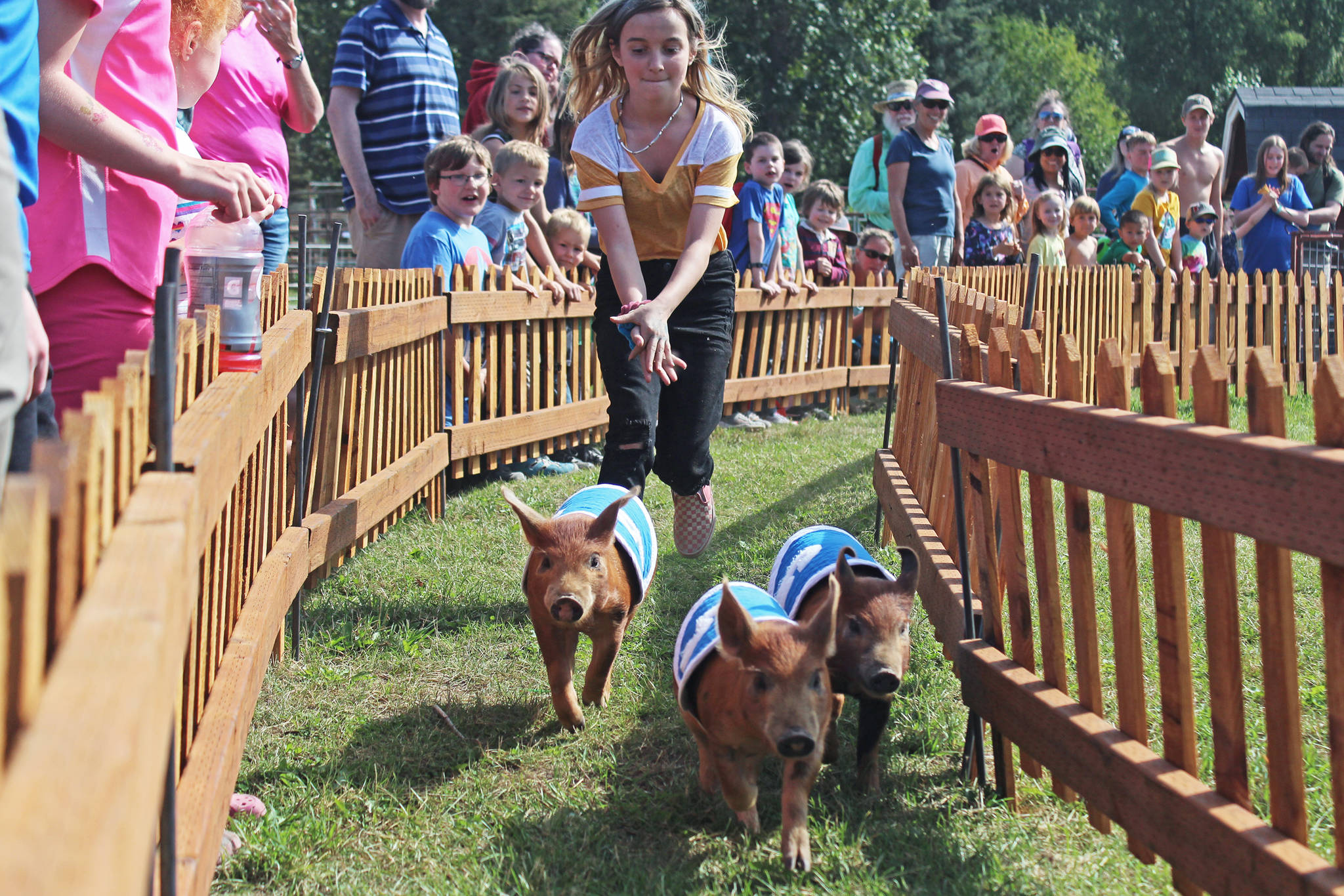Fair weather and fair fun were in abundance this weekend at the annual Kenai Peninsula Fair in Ninilchik.
Families from all over the peninsula converged on the fairgrounds to enjoy live music, classic games like the egg throwing competition, classic-to-Alaska games like the fish throwing contest, and the ever popular 4-H Junior Market Livestock Auction.
Participants in 4-H also showcased their talents in other ways not related to pigs, goats and cattle. The exhibit hall at the fairgrounds was filled to the brim this year with one-of-a-kind creations showcasing the talent of local youngsters and their love of Alaska. From handmade traditional Alaska Native mukluks, to miniature Lego replicas of the BB-8 android from the Star Wars film franchise, crafting skills of all kinds were on display.
Another big crowd-pleaser were the annual pig races. Businesses, including Alaska USA Credit Union, Diamond M Ranch and Matti’s Farm in Kenai, each sponsored a piglet. The animals race in two heats before a final showdown between the winners of those first two rounds.
Spectators place bets on which swine they favor to win, and those who win get to take tokens to the Ninilchik Thrift and Gift to redeem for prizes. All proceeds from the pig races go to support the fair.
This year’s first round of races featured a tight competition between a group of six piglets: Mary Hamkins, Petunia, Sir Oinks-a-lot, Lightning, Hamlet and Kevin Bacon. As the announcer noted between races, it’s “the largest baby pig race on the entire Kenai Peninsula.”
Petunia came out victorious against the winner of the first heat, Hamlet, to take home the trophy in Friday’s first round of racing.
The main event on Saturday was the 4-H Junior Market Livestock Auction, which featured pigs, cows, lambs, turkeys, geese and even a few pheasants raised over the last year by about 40 kids from clubs across the peninsula. The animals were judged on Friday and each category had a grand champion and a reserve champion, which were the first to be sold off Saturday afternoon. The animals were mostly bought by local organizations and businesses, including the Soldotna Rotary Club, which buys the grand champion pig each year.
This year’s grand champion pig was Chaos, raised by soon-to-be seventh grader Alekzander Angleton of Nikiski. Angleton is in his fourth year with the 4-H program and only his second year raising a pig for the auction. When asked how Chaos got his namesake, Angleton said that he was pretty wild as a piglet and was always causing trouble. As if to answer the question himself, Chaos knocked over his water bowl during Angleton’s interview. Despite his rebellious nature, Chaos drew a lot of compliments from this year’s judge, Rayne Reynolds, who told Angleton that the pig could easily be competitive on a national level.
Angleton said that one of the trickiest parts of raising a pig is training them for the showmanship aspects of the auction and getting the pig to “respect the stick.” Angleton’s advice for any would-be pig farmers out there is to give them a bowling ball to root around with so their neck muscles are exercised, and put a step in front of their trough to strengthen their front shoulders.
While Chaos may have won grand champion, he wasn’t the biggest pig in the pens. That title went to the Apocalypse, who came in at a remarkable 335 pounds and was raised from birth by Gracie Rankin. Rankin, also from Nikiski, said that this was her fifth year raising pigs but her first time raising one from birth rather than buying it as a piglet, which is more common. Rankin got two sows back in December, but unfortunately one of them died shortly after giving birth. Rankin said that she had to nurse Apocalypse by hand for a while, and the process of raising a pig from birth ended up being a lot more time-consuming than she expected.
“At one point I had five baby pigs in my living room,” Rankin said.
The kids responsible for raising the animals get to keep all the profits from each sale, with one notable exception. Each year features a charity animal, and this year’s was a pig named Chancho raised by Bailey Epperheimer of Nikiski. Epperheimer chose the Nikiski Children’s Fund to receive all of the revenue from Chancho’s sale, a charity that provides resources to Nikiski students in need.
This year’s auctioneers were Rayne Reynolds, Norm Blakely and Andy Kriner. All three had the high-speed auctioneer’s voice down to a science and managed to keep the crowd entertained by occasionally teasing the bidders into going for that extra 25 cents per pound. After each animal was successfully auctioned off, the audience also had a chance to “add on” by donating a little extra on top of the sale. Rep. Ben Carpenter, R-Nikiski, donated $25 to every kid who showed an animal on Saturday. All told, the kids received thousands of dollars in sales and donations from the businesses and individuals doing the bidding. Peak Oilfield Service alone bought five pheasants, three turkeys and three pigs.
The profits from the auctions are typically split between the cost of next year’s animals and savings accounts, but the kids are free to spend the money however they choose.
Reach Brian Mazurek at bmazurek@peninsulaclarion.com. Reach Megan Pacer at mpacer@homernews.com.


